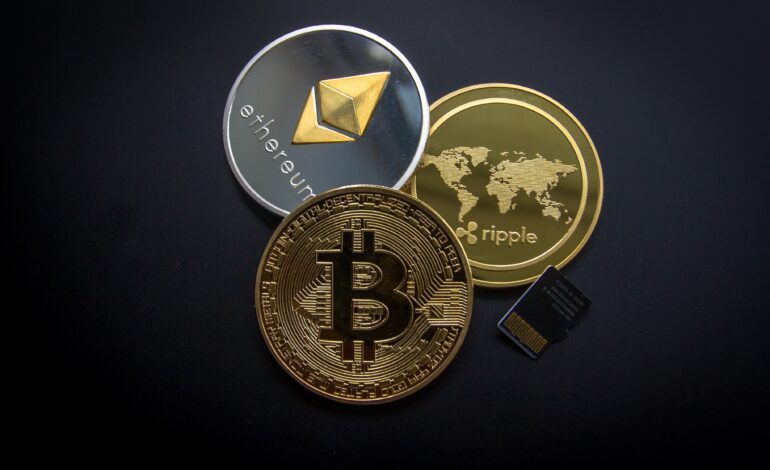
Cryptocurrencies and blockchain technology have revolutionized the world of finance and technology, offering innovative ways to transfer value, store data, and create decentralized applications. Let’s explore these concepts in more detail:
Cryptocurrencies
Cryptocurrencies are digital or virtual currencies that use cryptography for security. The most well-known cryptocurrency is Bitcoin, but there are thousands of other cryptocurrencies, often referred to as altcoins, such as Ethereum, Ripple, Litecoin, and many more. Cryptocurrencies are typically built on blockchain technology and offer various features and use cases beyond traditional fiat currencies.
Cryptocurrencies have become popular because they offer a unique way to store value digitally in a way that’s secure and accessible from anywhere in the world. Because they’re not issued by any central authority (like a bank or government), they’re also decentralized—there’s no one person or organization who controls them.
They’re also considered anonymous; users aren’t required to provide personal information when sending or receiving cryptocurrencies. This is different from fiat money systems like dollars or yen where you need to provide your name, address, date of birth, etc., when opening a bank account or making a purchase with credit cards or debit cards.
Blockchain Technology
Blockchain is a decentralized ledger that records and verifies transactions across multiple computers or nodes. It is a transparent and immutable system that ensures trust and security. Each transaction is grouped into a block, which is then added to a chain of previous blocks, forming a chronological record of all transactions. Blockchain technology eliminates the need for intermediaries, such as banks or third-party payment processors, as it relies on a network of participants to validate transactions.

The blockchain network consists of computers (or “nodes”) that are running software that validates new blocks of data and adds them to the chain. Once added to the chain, information cannot be changed without altering all subsequent blocks in the chain—which requires consensus from most of the members in the network.
Decentralization
One of the key aspects of blockchain technology is decentralization. Traditional systems, like centralized banks, rely on a central authority to control transactions and maintain records. In contrast, blockchain networks distribute control and decision-making among the network participants, making them more resistant to censorship, fraud, and hacking attempts.
In a centralized system, there is one central authority that controls the flow of information and makes decisions on behalf of all users. That means that if someone tries to hack into the system or change any data, they would have to get past only one person—the owner of that particular system.
In contrast, in a decentralized network like Bitcoin’s blockchain, there are thousands (or even millions) of computers that are all working together to process transactions and maintain records. If someone wanted to tamper with those records or create false ones by faking their own transaction on their own computer in an attempt to cheat other people out of money or some other valuable asset (like land titles), they would actually have to hack into thousands (or millions) of computers at once!
Smart Contracts
Smart contracts are self-executing contracts with predefined rules written into code. They automatically execute and enforce the terms of an agreement when specific conditions are met. Smart contracts run on blockchain platforms like Ethereum and enable the creation of decentralized applications (DApps) with a wide range of functionalities, including decentralized finance (DeFi), supply chain management, voting systems, and more.
The smart contract is a digital version of a traditional contract that lives on a blockchain network. The contract contains all relevant data and rules required to execute an agreement between two or more parties. In addition to allowing an automated execution of contractual obligations, smart contracts also enable transparency and trust between all participants since they are stored on a decentralized network that is not controlled by any single party.
Use Cases
Financial Services: Cryptocurrencies enable faster and cheaper cross-border transactions, micropayments, remittances, and access to financial services for the unbanked or underbanked populations.
In order to take advantage of these benefits, however, the public must be able to use cryptocurrencies as a medium of exchange in everyday life. To make this possible, we are working on creating a wallet that can be used by anyone in any country at any time.
Supply Chain Management: Blockchain is a technology that allows two parties to exchange information without the need for a third-party intermediary. Blockchain’s distributed ledger technology enables companies to track supply chain data and product quality, ensuring that what you buy is exactly what you need. By tracking product quality and ensuring ethical sourcing, blockchain can enhance supply chain transparency and traceability. This will reduce fraud, counterfeiting, and ensure ethical sourcing.
Intellectual Property: Blockchain is a powerful tool for protecting intellectual property rights and ensuring fair compensation for creators. Blockchain technology can create transparent royalty systems, in which the amount paid to each creator is visible to all parties. This allows for more efficient royalty distribution, as well as greater accountability. Blockchain also offers a way to protect intellectual property rights by creating tamper-proof records of ownership and transactions.
Energy Trading: Blockchain is a digital ledger that can be used to record transactions. What makes it unique is its decentralized nature, which allows for the creation of a shared database across a network of computers. This database contains a permanent and unchangeable record of transactions between two parties, which are verified by all members of the network. In the energy sector, blockchain technology has the potential to facilitate peer-to-peer energy trading, allowing individuals to buy and sell energy directly, promoting renewable energy adoption, and reducing reliance on centralized power systems.
As you now know, the world of cryptocurrency and blockchain technology is constantly evolving. New innovations and use cases continue to emerge, and it’s important to stay up-to-date on these topics. Understanding the basics of these concepts can help you navigate this exciting field and explore its potential applications.
RUCHI RATHOR Founder & CEO
Payomatix Technologies Pvt. Ltd.
FOUNDER AND INVESTOR | PAYMENTS PROCESSING EXPERT | MERCHANT ACCOUNT SOLUTIONS | WHITE LABELLED PAYMENT GATEWAY | Dreamer, Creator, Achiever, Constantly Evolving
Website Ruchi Rathor: https://ruchirathor.com
Website Healing Heart https://thehealingheart.me/
Instagram https://www.instagram.com/_ruchirathor_/
LinkedIn https://www.linkedin.com/in/ruchirathor12/
Facebook https://www.facebook.com/ruchi.rathor.magnificient
Tumblr https://www.tumblr.com/blog/ruchirathor-thehealingheart
Medium https://medium.com/@ruchirathor_23436









